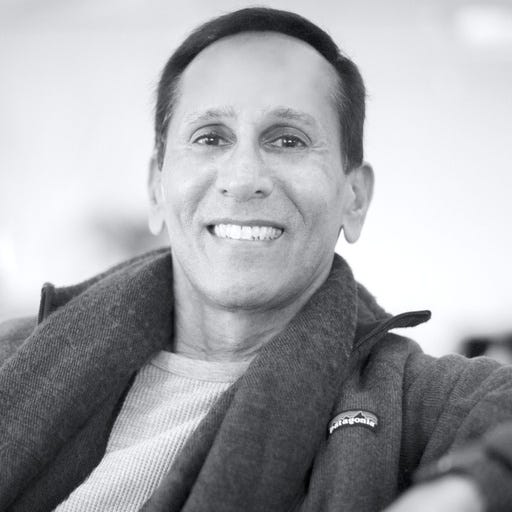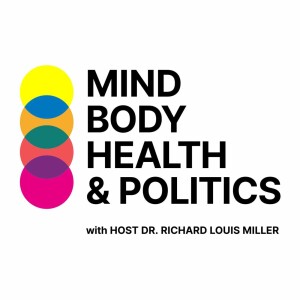
Dear listeners,
Did you know that an estimated one billion people around the world suffer from some form of mental health issue? Who among us believes that our current system for treating such widespread anxiety and depression is adequate?
Whenever I openly discuss psychedelic medicines with my guests on this broadcast, I am taking a risk. However, I believe it is important to shed as much light on this topic as possible, rather than keeping people in the dark about their healing potential—or the potential harms when taken by the wrong people or in the wrong ways.
My guest this week, Neil Gehani, contacted the show after reading our newsletter announcement seeking people who had profound psychedelic healing experiences. We must include the usual disclaimer that we do not endorse any illegal experimentation. Instead, we aim to become a node in a broader network that shares information so that the public can make informed decisions.
"If you are always craving and always avoiding, you will never be able to enjoy and be present in the moment." - Neil Gehani
Neil is a first-generation Indian immigrant who came to the United States at the age of 16. He grew up in India, where he attended a military boarding school beginning at the age of 4 and a half. He earned his engineering and MBA degrees in Ohio, and soon after moved to California to work in the technology sector. Over the past 15 years, he has been a software engineer and product management leader, holding three Head of Product positions and founding two companies.
In recent years, he has focused on mental health due to his own personal journey and the numerous challenges he faced while seeking help. He is now building MindLumen (mindlumen.xyz), which aims to democratize safe access to ethical care. Psychedelic-assisted therapy changed his life, and he wants to use his skills and experience to help others navigate the complex process safely. Neil has moderated panels, spoken publicly, and is involved in policy work to decriminalize psychedelics everywhere.
Neil invites our listeners to connect with him on LinkedIn.
We too invite our listeners to connect with us by email or social media, to assist in our ongoing efforts to enlighten the public – including information on the adverse effects of psychedelics. That is the subject of our forthcoming series, and will be the topic of my next book.
Please, don’t be a stranger. Reply to this email if you have a story to share, or know someone who may be interested in participating in this series of interviews.
Golden light,
Dr. Richard L. Miller
The podcast and abbreviated notes are always freely available thanks to our paid subscribers. Please share this post to show your support for transparency.
Show notes:
* How Neil’s first psychedelic experience with MDA in 2017 transformed his way of thinking and relating to other people.
* Neil’s journeys with high doses of various substances, including MDMA, Psilocybin and LSD.
* What inspired Neil to create the MindLumen platform, and the mission of helping others navigate a complex process.
* to help people suffering from mental health issues and anxiety to experience the therapeutic benefits of psychedelics.
* Why living in the present moment is key to enjoying life.
Links and references:
* linkedin.com/in/gehanineil
* twitter: @mindlumen
* Mindlumen
Seeking Psychedelic Testimonials: The Good, the Bad, and the Ugly.
We are currently looking for first-hand accounts of adverse effects of psychedelics—from ‘bad trips,’ to unwanted physiological complications, to abusive practices by guides, therapists, and shamans.
The interviews from this series will go into a forthcoming book on the topic—perhaps the first book its kind.
Please contact me if you would like to be interviewed.
Mind Body Health & Politics is a reader-supported publication. To receive new posts and support my work, consider becoming a free or paid subscriber.
Transcript
Dr. Richard L. Miller (00:15): Today, we are honored to have Neil Gehani with us. He contacted us after reading our newsletter, where we were looking for people who have had psychedelic experiences that have made profound changes in their lives. Welcome to Mind Body, Health and Politics, Neil.
Neil Gehani (03:10): Thank you. Thank you, Richard, for having me here.
Dr. Richard L. Miller (03:13): Neil, you came over to this country from India when you were, what, four and a half years old?
Neil Gehani (03:22): Well, I was actually in India. I was sent to India at a military boarding school. At four and a half I was handed off to a flight attendant and they took care of me and dropped me off to my uncles in Mumbai. And then he dropped me off in a train and I was picked up by somebody, some strangers in Puna, and that's where I went to school. So I didn't see my family for nine months out of a year from the time I was four and a half till the time I graduated high school. I came to this country after that when I was 16 years old, and I didn't know a soul in this country, and I ended up in the Midwest to go get my education.
Dr. Richard L. Miller (03:57): So your parents sounds like they were very influenced by the English educational system where the upper classes sent their children to boarding schools when they were four and a half or five years old.
Neil Gehani (04:15): The notion of a boarding school is often associated with wealthy families in America, but this was not the case for me. It was simply a school where someone could take care of me, and I didn't go home every weekend. It was the cheapest option for my parents, who did not have college degrees and worked as a technician in a telephone company and a flight attendant. My mom worked her entire life in the airlines to get a 90% discount for us, even though she hated the job. She decided to work there until all of us finished school so she could fly us back and forth every four and a half months.
More Episodes
 2023-05-02
2023-05-02
 2023-02-28
2023-02-28
 2023-01-31
2023-01-31
Create your
podcast in
minutes
- Full-featured podcast site
- Unlimited storage and bandwidth
- Comprehensive podcast stats
- Distribute to Apple Podcasts, Spotify, and more
- Make money with your podcast
It is Free
- Privacy Policy
- Cookie Policy
- Terms of Use
- Consent Preferences
- Copyright © 2015-2024 Podbean.com






